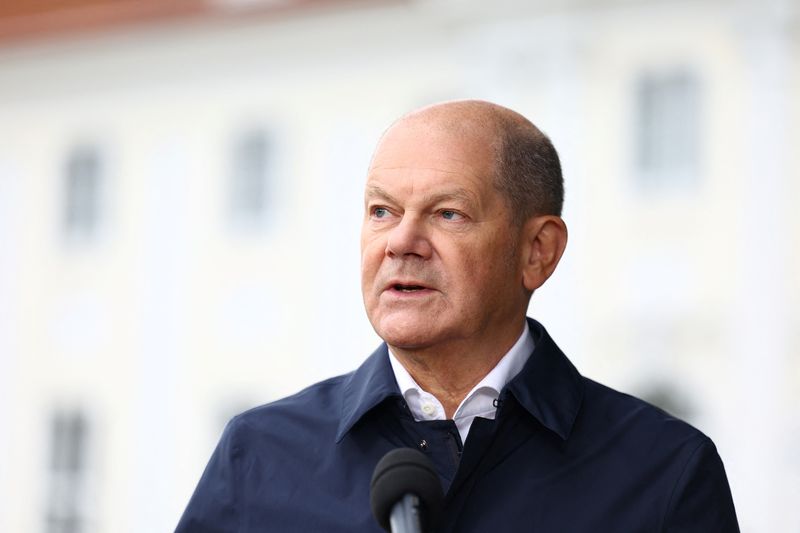Germany agrees 7 billion euro tax cut to boost flagging economy
2023.08.29 09:34

© Reuters. German Chancellor Olaf Scholz gives a statement ahead of a closed cabinet meeting at Schloss Meseberg, near Gransee, Germany, August 29, 2023. REUTERS/Lisi Niesner
By Andreas Rinke and Maria Martinez
MESEBERG, Germany (Reuters) – Germany’s fractious coalition put aside weeks of squabbling on Tuesday, agreeing to a 7 billion euro ($7.56 billion) corporate tax relief package designed to give a flagging economy what Chancellor Olaf Scholz called a “big boost”.
An earlier attempt to pass the package, labelled the “Growth Opporunities Law”, was stymied by Greens Family Minister Lisa Paus, who sought 12 billion euros for a new child support benefit.
The package was agreed for four years.
According to the draft of the law seen by Reuters, in its first year it will cause a tax revenue shortfall of 2.6 billion euros for the federal government, 2.5 billion euros for the states and 1.9 billion euros for the municipalities.
“We’ll discuss how to achieve a big boost,” Scholz said at the start of the two-day cabinet retreat at Schloss Meseberg, a baroque castle outside Berlin. “The German economy can do more.”
The initial failure to pass the growth package, championed by liberal Finance Minister Christian Lindner, was seen as a sign that the coalition of two socially-minded leftist parties and one economically liberal party was too unwieldy to govern.
The path was cleared to pass the growth package when the two sides agreed to cut the planned Child Basic Insurance to just over 2 billion euros in size.
The law gives incentives to companies to make climate friendly investments, provides tax incentives for research and allows companies to offset more losses against profits from other financial years.
The German economy stagnated in the second quarter, showing no sign of recovery from a winter recession and cementing its position as one of the world’s weakest major economies.
($1 = 0.9265 euros)








